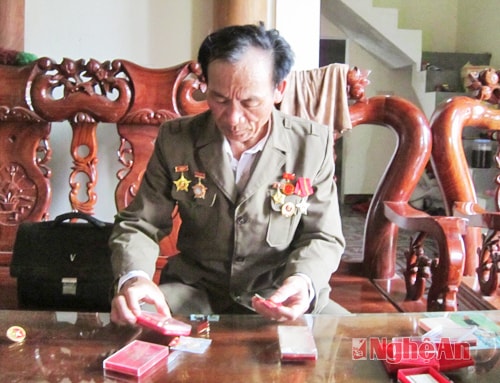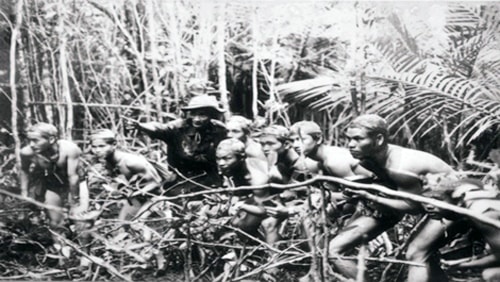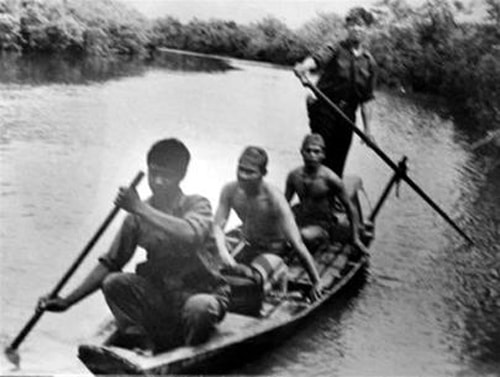Meet the Sac forest commando
(Baonghean) -In the past, every time they heard the name of the Sac Forest Special Forces, the Americans and puppets were terrified by their elite, bravery and intelligence in combat. Among the thousands of soldiers of the Sac Forest Special Forces Regiment, there were many who came from Nghe An. On this occasion, we were fortunate to meet Mr. Nguyen Viet Dung - a son of Nghe An who was once in the Sac Forest Special Forces and listened to him tell stories of his time in combat...
 |
| Mr. Nguyen Viet Dung and war relics. |
We went to hamlet 8, Hung Xuan commune (Hung Nguyen) to meet Mr. Nguyen Viet Dung on a day at the end of April, when the whole country was looking forward to the 39th anniversary of the complete liberation of the South and the reunification of the country. At the age of 63, Mr. Dung is still very agile, active, his legs and arms are still strong. Perhaps, the years of training on the battlefield have helped him gain that abundant source of strength and endurance. Over a pot of green tea, the former Sac forest special forces soldier recounted his memories of his time fighting. At the beginning of the story, Mr. Dung confided: “In our generation, most men held guns to fight the enemy, facing many dangers and hardships. But as a special forces soldier, the hardships and dangers increased many times over, the boundary between life and death was always just a hair's breadth. Therefore, being able to return to his family and homeland is actually a blessing.”
Nguyen Viet Dung was born and raised in Hung Xuan commune, a rural area located downstream of Lam river, where the famous Yen Xuan bridge in history is located. In 1970, the war against the US was getting more and more fierce, the 19-year-old young man volunteered to join the army with the desire to contribute his strength to defeat the invaders, bringing peace to his homeland. When joining the army, Nguyen Viet Dung was assigned to the water special forces unit, directly under the Navy Command. A year of training in Hai Phong. More than 40 years have passed, Mr. Dung still cannot forget the cold winter nights practicing river crossing with his teammates. The cold penetrated his skin, his muscles and even his bones. Sometimes, he lay in the middle of the swamp all day, letting mosquitoes and other insects bite his skin. At times like that, the bravery of the special forces soldiers was further tempered, everyone expressed their determination to endure hardships, to sacrifice to fulfill their duty to the Fatherland. After completing training, Nguyen Viet Dung was transferred to the Sac Forest Special Forces Regiment. At this time, he and his troops crossed the forest "Splitting Truong Son to save the country", overcoming many hardships under the enemy's rain of bombs and bullets. Not to mention the malaria that tormented and defeated many of his comrades on the march. Mr. Dung's unit operated in the Southeast region with the mission of participating in attacks on enemy ships and warehouses in the port with the aim of preventing the enemy from transporting weapons, equipment, fuel and other necessities to the battlefields to cause losses to our troops. And here, the special forces soldier from his hometown of Nghe An participated in many fierce battles, faced danger many times and, with his comrades, sank 4 enemy transport ships. At the same time, participated in anti-sweep operations in Dong Nai area and sank 2 enemy warships on Thi Vai river.
Mr. Dung still remembers clearly the feeling of the first time he went into battle, both nervous and a little worried in the vast sky and water, the rain was beating on his face, but above all was the spirit of determination to fight and win. That time, Company Commander Pham Ngoc Bay and his fellow countryman Phung Ba Dien were ordered to win at all costs, to cross the river to Rach Dua port (Vung Tau) to sink the enemy ship. He and two teammates were assigned to reconnaissance, clearly understood the rules of operation, then found a way to approach the enemy transport ship. Seizing the opportunity when the enemy was careless, the three men pushed the mine weighing more than 100kg close to the side of the ship, near the engine compartment, set the timer and retreated safely in each direction. At the shelter, Mr. Dung waited anxiously... Then a loud explosion echoed throughout the river area, followed by a series of smaller explosions.
The fire covered the entire river, the smoke billowed high and spread to the villages. The alarm siren wailed loudly, enemy canoes, ships and planes came in droves but it was too late, it could be said that at this point there was no way to save them. The mission assigned by the superiors had been completed, soldier Nguyen Viet Dung was so happy that he burst into tears. At this moment, he remembered his fallen comrades, then remembered his homeland, where his parents were busy working in the fields, where his younger siblings went to the fields every day to pick up each potato and each rice flower. Returning to the base, the three soldiers met again, held hands tightly and smiled victoriously. Immediately after, tears fell again and choked sobs arose when remembering their fallen comrades: "Brothers! We have avenged you!"
The Sac Forest special forces soldier in the past said that special forces soldiers, especially water special forces soldiers, must have a strong will, because they must always operate in extremely dangerous environments. In many situations, the line between life and death is as thin as a hair. To infiltrate enemy ships and warehouses at ports, Sac Forest special forces soldiers must dive underwater, holding a small tube in their mouths to breathe air. In important locations such as warehouses and ports, the enemy often keeps close watch, dividing into many layers to guard. Not to mention the barbed wire fence system and German Shepherd dogs. To prevent our special forces from infiltrating, enemy guards often throw grenades into the water. Many of our soldiers have died from shrapnel when infiltrating. Therefore, to limit risks and sacrifices, to be sure of victory, we must conduct good reconnaissance, grasp the situation and the enemy's rules of operation. Special forces soldiers had to stay underwater all day, breathing tubes or camouflage themselves under water hyacinths to hide from the enemy. The most important thing was to know the enemy's eating and resting schedule and find the moment of weakness. At the same time, they had to know the time interval between when the enemy threw the grenade so that when the enemy had just finished throwing it, the soldiers could immediately approach the target, set the mines and set the timer, then retreat safely, ensuring that the enemy would not cause any injuries when the next round was thrown. Not to mention the times when they penetrated deep into the enemy's rear, they had to hide behind trees and bushes to avoid being detected by the enemy's spies, so that the German Shepherds could not sniff them out.
Sometimes, we had to lie in the middle of mudflats or mangrove forests for days and nights to scout the enemy situation. At times like that, the biggest worry was not the enemy's guns or grenades, but the sharp, ferocious teeth of the crocodiles. Because the mudflats and mangrove forests in the Southeast region at that time were countless crocodiles. Mr. Nguyen Viet Dung himself had witnessed his teammates being mauled by crocodiles and injured, blood flowing everywhere and then forming puddles. When approaching the target, the risk level was often very high, just a small mistake or being discovered by the enemy and having the grenade thrown into the river, the chance of a safe retreat was very rare. If we sacrificed, our bodies were often not intact, often swept away by the water and lost or became prey for crocodiles. But as Sac Forest special forces soldiers, everyone was ready to accept the mission, no one was afraid of sacrificing. Because they fought to avenge their comrades, to avenge their loved ones and relatives who had fallen because of American and puppet bombs.
 |
 |
| Water commando soldiers in the Sac forest special zone. Photo courtesy |
The operating area of Sac forest special forces soldiers is often in enemy-controlled areas, so the protection and care of the people is always vital. Mr. Nguyen Viet Dung was once shared with green bananas, wild bamboo shoots and brown tubers by local guerrillas and villagers when the food ran out. During a battle, due to the strong river current, he and his comrades were drifted out to sea. Here, he clung to a fishing boat, the boat owner let him lie close to the bottom of the boat, next to some baskets of fish, covered it with an umbrella to cover it and took him back to base. And Mr. Dung could never forget the memories with Mrs. Ba and Mr. Nam Kiem. Both husband and wife participated in revolutionary activities, they fought in the local guerrilla army. When she was heavily pregnant, Mrs. Ba still followed her husband to base. Then she gave birth to a baby boy right in the middle of the forest where our army was hiding. Mr. Nam Kiem and his wife named the baby Dung to express their admiration for a Sac forest special force soldier. Because, Mr. Nguyen Viet Dung at that time was the team leader in charge of operations in this area.
Mr. Dung confided: "For me, the time fighting in the Southeast battlefield was the most glorious and proudest years of my life." It is understandable that during the war, this special forces soldier was awarded the Medal of Honor (Third Class), 5 Certificates of Merit of various types, the Medal of Traffic Fighter and was a regimental level Emulation Fighter. And in 1972, after a deep penetration into the enemy's rear, reconnaissance and burning down the enemy's fuel depot, the 21-year-old soldier was admitted to the Party right in the middle of the battlefield. And even more proud, up to now, his Sac Forest Special Forces Regiment has been awarded the title of Hero of the People's Armed Forces twice. Mr. Dung himself and his comrade, teammate and fellow countryman Phung Ba Dien are being proposed by the State to be awarded the title of Hero.
In 1974, after participating in a battle against the Can, Nguyen Viet Dung was wounded and transferred to the North for recuperation. On April 30, 1975, upon hearing the news that the South was completely liberated, he and his fellow wounded soldiers hugged each other and cheered with joy. Then tears suddenly fell, at that moment he remembered his comrades who had fallen and remained forever on the battlefield, unable to witness the happy day of reunification of the two regions.
Returning to normal life, Mr. Nguyen Viet Dung has actively contributed his efforts to build his hometown. He used to be the leader of the production team, was the Party cell secretary for many years, and is currently the head of the Hung Xuan Agricultural Cooperative. In combat, he was a brave soldier, in business and production, Mr. Dung is considered an enthusiastic, dynamic person, daring to think and act. Under his management, the Cooperative is operating more and more effectively with the development of services related to agricultural production.
Last year, having the opportunity to meet the officers and soldiers of the Sac Forest Special Forces Regiment and revisit the old battlefield, Mr. Dung was truly amazed by the many changes in this land. The mudflats, river sections, and forests that once saw fierce battles have now become attractive tourist destinations. Here, he met Mrs. Ba (Mr. Nam Kiem's wife) who is over 90 years old and still recounts the stories of decades ago. And the little boy Dung who cried out at birth in the middle of the fighting base is now a 41-year-old man. Walking through the Sac Forest Cemetery, he again sadly remembered his comrades and teammates from the past who are now resting. The days of fighting full of hardship and sacrifice appeared clearly like a slow-motion film...
Cong Kien






